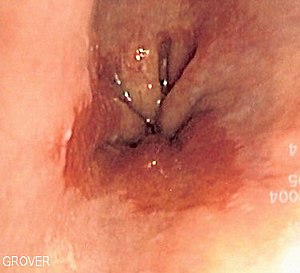Barrett’s Esophagus is Pre-Cancer. Consider Evidence-based, non-toxic therapies to heal GERD, Barrett’s Esophagus and reduce your risk of Esophageal Cancer
According to research approximately 18.6 million Americans had symptoms of Gastrointestinal Reflux Disease (GERD). About 10%-15% percent of GERD patients will develop Barrett’s Esophagus (BE).
Less than 1% of Barrett’s patients will develop esophageal cancer. A small percentage but a substantial number of people diagnosed annually with an aggressive cancer.
GERD or Barrett’s Esophagus is your incentive to take steps to reduce your risk of esophageal cancer. Curcumin, one of many non-toxic therapies shown to reduce the risk of esophageal cancer, is inexpensive and proven.

Do you suffer from GERD? BE? EC? Are you interested on safe, non-toxic therapies to reduce your risk of esophageal cancer?
I am a long-term cancer survivor and cancer coach. I take Life Extension Super Bio Curcumin daily. This brand of curcumin is more bioavailable than others and has been tested and approved by consumerlab.com.
Scroll down the page, post a question or comment and I will reply to you ASAP.
thanks,
David Emerson
- Cancer Survivor
- Cancer Coach
- Director PeopleBeatingCancer
Reommended Reading:
“GERD, also known as acid reflux, is a long-term condition where stomach contents come back up into the esophagus resulting in either symptoms or complications.[4][5] Symptoms include the taste of acid in the back of the mouth, heartburn, bad breath, chest pain, vomiting, breathing problems, and wearing away of the teeth. Complications include esophagitis, esophageal strictures, and Barrett’s esophagus.[4]“
“Turmeric obtained from the rhizomes of Curcuma longa has been used in the prevention and treatment of many diseases since the ancient times. Curcumin is the principal polyphenol isolated from turmeric, which exhibits anti-inflammatory, antioxidant, antiapoptotic, antitumor, and antimetastatic activities.
The existing evidence indicates that curcumin can exert a wide range of beneficial pleiotropic properties in the gastrointestinal tract, such as protection against reflux esophagitis, Barrett’s esophagus, and gastric mucosal damage induced by nonsteroidal anti-inflammatory drugs (NSAIDs) and necrotizing agents.
The role of curcumin as an adjuvant in the treatment of a Helicobacter pylori infection in experimental animals and humans has recently been proposed. The evidence that this turmeric derivative inhibits the invasion and proliferation of gastric cancer cells is encouraging and warrants further experimental and clinical studies with newer formulations to support the inclusion of curcumin in cancer therapy regimens. This review was designed to analyze the existing data from in vitro and in vivo animal and human studies in order to highlight the mechanisms of therapeutic efficacy of curcumin in the protection and ulcer healing of the upper gastrointestinal tract, with a major focus on addressing the protection of the esophagus and stomach by this emerging compound…”
“Gastric intestinal metaplasia (GIM) is the essential pre-malignancy of gastric cancer. Chronic inflammation and bile acid reflux are major contributing factors. As an intestinal development transcription factor, caudal-related homeobox 2 (CDX2) is key in GIM. Resveratrol has potential chemopreventive and anti-tumour effects. The aim of the study is to probe the effect of resveratrol in bile acid-induced GIM.
We demonstrated that resveratrol could reduce CDX2 expression in a time- and dose-dependent manner in gastric cell lines. A Cignal Finder 45-Pathway Reporter Array and TranSignal Protein/DNA Array Kit verified that resveratrol could increase Forkhead box O4 (FoxO4) activity and that Chenodeoxycholic acid (CDCA) could reduce FoxO4 activity. Furthermore, bioinformatics analysis showed that FoxO4 could bind to the CDX2 promoter, and these conjectures were supported by chromatin-immunoprecipitation (ChIP) assays.
Resveratrol can activate FoxO4 and decrease CDX2 expression by increasing phospho-FoxO4 nucleus trans-location. Resveratrol could increase FoxO4 phosphorylation through the PI3K/AKT pathway. Ectopic FoxO4 expression can up-regulate FoxO4 phosphorylation and suppress CDCA-induced GIM marker expression.
This study validates that resveratrol could reduce bile acid-induced GIM through the PI3K/AKT/p-FoxO4 signalling pathway and has a potential reversing effect on GIM, especially that caused by bile acid reflux…”
“We examined the molecular mechanism of curcumin in a preventive and therapeutic model of indomethacin-induced gastric ulceration with regard to angiogenic processes.
RESULTS:
Disrupted blood vessels, reduced collagen matrices, and significant (60%) injury to mucosal cells were observed during ulceration. In addition, ulcerated tissues exhibited decreased matrix metalloproteinase (MMP)-2 and vascular endothelial growth factor (VEGF) expression in blood vessels. Interestingly, curcumin blocked ulceration by induction of collagenization and angiogenesis in gastric tissues via upregulation of MMP-2, membrane type (MT) 1-MMP, VEGF, and transforming growth factor (TGF)-β at protein and messenger ribonucleic acid (mRNA) levels. To examine the angiogenic properties of curcumin, we employed a chorioallantoic membrane model and Matrigel assay. During healing, curcumin promoted collagenization and angiogenesis as well as enhanced MMP-2 activity via positive MT1-MMP regulation and negative tissue inhibitor of metalloproteinase-2 regulation.
INNOVATION:
Our study demonstrates that curcumin-mediated healing is associated with increased MMP-2, TGF-β, and VEGF expression and that it plays a pivotal role as an angiogenic modulator by stimulating vascular sprout formation and collagen fiber restoration in ulcerated tissues.
CONCLUSION:
We conclude that curcumin remodels gastric tissues by restoring the collagen architecture and accelerating angiogenesis.
APPIP ERROR: amazonproducts[
AccessDeniedAwsUsers|The Access Key Id AKIAJAJ37JVNL7OUU4CA is not enabled for accessing this version of Product Advertising API. Please migrate your credentials as referred here https://webservices.amazon.com/paapi5/documentation/migrating-your-product-advertising-api-account-from-your-aws-account.html.
]




